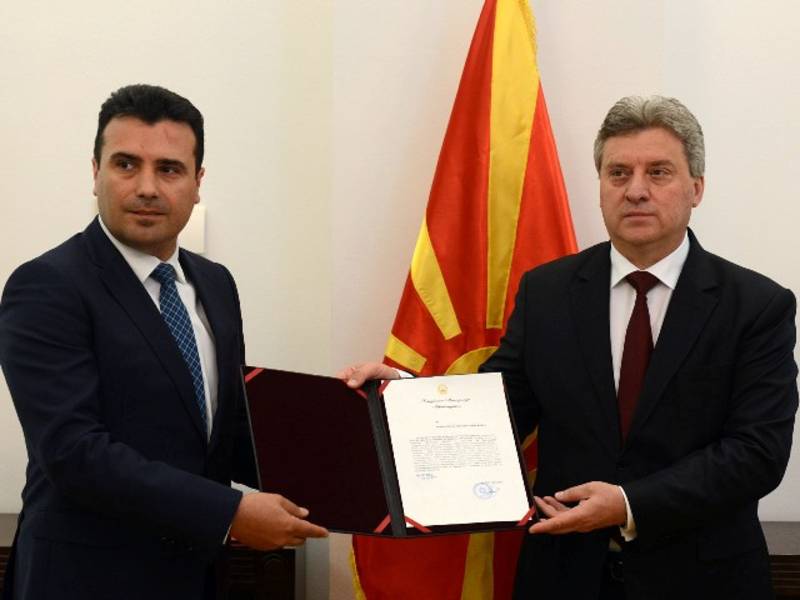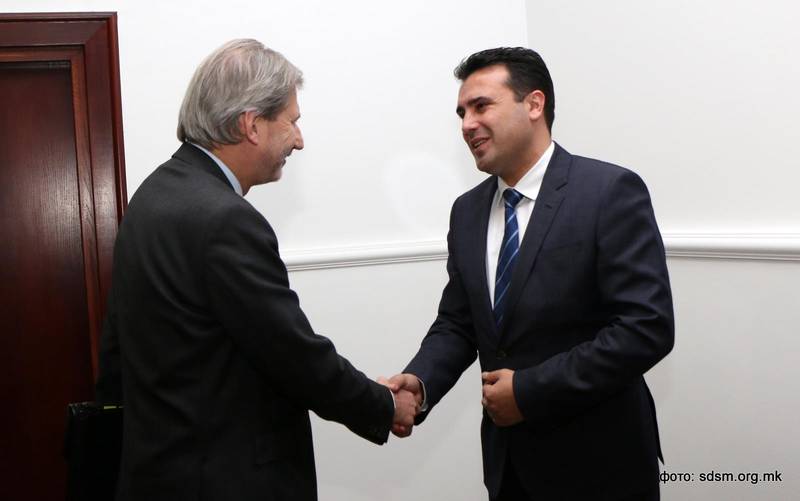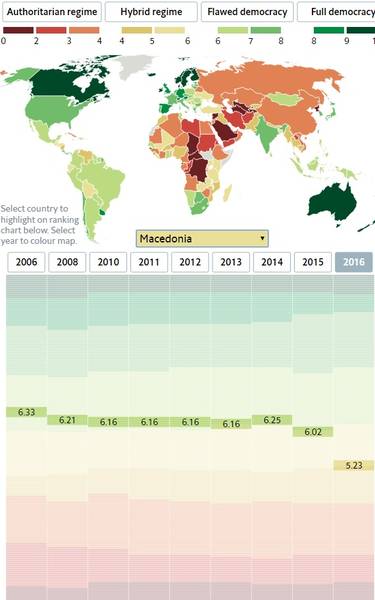Is Crisis in Macedonia Coming to an End?
Adelina Marini, May 18, 2017
At long last there are some good news coming from the Western Balkans, shaken in recent months by a constant rise in tensions, renewed sabre rattling, readiness for new interethnic conflicts and, of course, with Russia's helpful role. Macedonian President Georgi Ivanov has finally handed opposition leader Zoran Zaev a mandate to form a government five months after the snap parliamentary elections in the country. Five months, marked by a violation of the Macedonian Constitution, a bloody attack on the parliament of the former Yugoslav Republic, a fuelling of interethnic hatred, and a vague attempt to renew EU presence in the country and the region in general.

Under pressure by the international community and Macedonian society, the president handed over the mandate after he received guarantees from Mr Zaev that he would work to preserve the territorial integrity of Macedonia and will respect the Constitution. The reason for demanding guarantees were the Albanian parties, who supported the Social Democratic Union of Macedonia (SDSM), after signing a platform in January in Tirana, demanding full equality, in accordance with the Constitution, which included linguistic equality - that is, bilingualism - holding a debate about the flag, anthem, and the state coat of arms of Macedonia, so that they reflect the multi-ethnic character of the country. The platform also called for the adoption of a resolution in Parliament, which would condemn the genocide over the Albanian people in Macedonia in the period 1912-1956.
Among other demands in the Tirana platform is strengthening of the rule of law and the implementation of reforms related to the European integration of the country. Support is also sought for the Special Prosecutor, who is investigating the recordings leaked by the SDSM, which accuse former rulers, led by Nikola Gruevski, in a number of violations. The document also seeks to resolve the dispute with the name of Macedonia, establishing good relations with neighbours, and accelerated integration into the EU and NATO. The document has sparked sharp reactions across the region, not only in Macedonia, as it is linked to increasingly frequent statements by Albanian political officials about the creation of Greater Albania.
In an interview for the regional television channel N1 (a CNN affiliate), Zoran Zaev stated there was no room for larger countries either in Europe or in the Western Balkans region. According to him, the future of Macedonia is in the EU, where there are no borders and the freedom of movement of citizens is guaranteed. The parties which Zoran Zaev is yet to negotiate with to form a government are the Democratic Union for Integration of Ali Ahmeti, the Alliance for Albanians and Besa. Some of these parties were already part of government, only in a coalition with Nikola Gruevski's VMRO-DPMNE. Zoran Zaev has promised that within ten days a government will be formed and it will be voted in parliament.
EU High Representative for Foreign Affairs and Security Policy Federica Mogherini (Italy, Socialists and Democrats) and EU enlargement negotiations Commissioner Johannes Hahn (Austria, EPP) welcomed the decision of the head of state to give Zoran Zaev a mandate as "an important step in the process of government formation". The EU expects a swift formation of a government willing to stick to the Pržino Agreement and the reform programme. The Pržino Agreement of 2 June 2015 was negotiated with the EU's mediation in order to put an end to the crisis, provoked by the facts revealed by leaked recordings of conversations of senior state officials, including then Prime Minister Nikola Gruevski.

With this agreement, all political parties commit to putting the country's interests above everything else; respect democratic principles; and work to improve relations with neighbouring countries. Almost two years after the signing of the agreement, it appears that the country is ready to emerge from the crisis. The damage and the challenges, however, are great. For the past almost 12 years, ever since Macedonia was granted candidate status, the country has failed significantly in terms of democratic standards, including freedom of speech. According to this year's Reporters Without Borders index of press freedom, Macedonia is ranked 111th. In 2005, when the European Commission granted it candidate status, Macedonia was 43rd in this ranking.
In this period, according to the The Economist Intelligence Unit's democracy index, the former Yugoslav Republic has taken a huge step backward - it has fallen out of the flawed democracies group and into the one of hybrid regimes. This is the last step before a full-fledged authoritarian regime. The decline raises the question of whether Macedonia still qualifies as a candidate for EU membership. The same question stands for Turkey, as euinside recently reported. The task faced by the new government, part of which will be parties that have been involved in governance throughout this  process of democratic decline, will be extremely difficult. No less challenging will be the behaviour of the now oppositional VMRO-DPMNE. In order for Macedonia to progress, it needs a national consensus on the way forward. Building such a consensus is yet to come.
process of democratic decline, will be extremely difficult. No less challenging will be the behaviour of the now oppositional VMRO-DPMNE. In order for Macedonia to progress, it needs a national consensus on the way forward. Building such a consensus is yet to come.
It is also very important for the EU to play its role adequately. During her visit to the Western Balkan countries in March, Federica Mogherini found out first-hand how far the EU is from what is happening in the region. She tried to draw the Union's attention to the problems, but much more needs to be done. The EU must be as committed as possible to the region and, in the case of Macedonia, to do its part. The promise of accession negotiations must be embodied by a specific commitment, one that includes Greece as well, which has not yet lifted its veto off the opening of negotiations with Macedonia. The former Yugoslav republic has experienced a severe crisis that could have a great cost to it, but also to the entire region and the EU, and now needs the full support of the Union in order to manage to get out of the political crisis for good.
The Berlin process summit, which will take place this year in the Italian city of Trieste, will be a good occasion to support Macedonia's efforts to return to the path of European integration. But it will be a mistake if the EU decides that with the formation of a new government the challenges facing Macedonia and the region in general have disappeared. The difficult part is yet to come, especially in the complex geopolitical context in which destabilising factors are already much more than the stabilising ones. Not one of the many tasks in the region can be resolved without the Belgrade-Pristina dialogue expanding into a dialogue between Serbia and Albania, again with EU facilitation. As President Trump's administration continues to be unpredictable, the EU is in fact alone in the challenge of coping with another rise of tensions in the Balkans.
Translated by Stanimir Stoev
 Bakir Izetbegovic, Andrej Plenkovic | © Council of the EU
Bakir Izetbegovic, Andrej Plenkovic | © Council of the EU Aleksandar Vucic, Recep Tayyip Erdogan | © Serbian Presidency
Aleksandar Vucic, Recep Tayyip Erdogan | © Serbian Presidency Jean-Claude Juncker, Zoran Zaev | © European Commission
Jean-Claude Juncker, Zoran Zaev | © European Commission